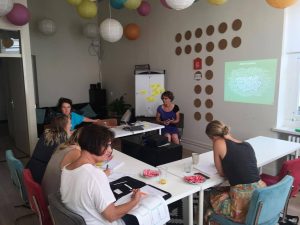On June 22, 2017, I hosted a workshop on sustainability reporting for companies just starting on their reporting journey and those eager to take their reporting to a higher level. Here are some of the key learnings from the workshop, which took place at The Terrace.
Start from why
We kicked off the workshop with a brainstorm on the reasons to publish a sustainability report. The participants came up with many: engaging stakeholders like clients, suppliers, and NGOs; having something tangible to prove what we claim to be doing; measuring and communicating our impact; accountability; informing and influencing employees to deliver on our sustainability strategy and more. Some are more internally focused, others are more externally oriented. Some relate to managing risks, others to identifying opportunities.
Make the complex simple
At the start of the workshop, we provided all participants an empty template for the reporting process. Using interactive exercises and group discussions, we jointly walked through the various steps in the reporting process. Here are some of the key questions we answered in the course of the workshop.
Prepare: Who’s on the team? What are the tasks and timings? what budget is available? What are your initial ideas on topics to include in the report?
Engage: Which stakeholders are impacted by how you do business, and vice versa, which impact your business success? How can you engage with them effectively to understand their issues?
Focus: What are the material (or important) topics to include in your report (and in your strategy of course)? How does the prioritization of these topics compare for senior management versus the stakeholders’ interests? What are the targets and measures for each of the material topics? And how will you achieve these targets?
Collect: Which sources are available to collect the information for your report? Who needs to be involved? And when do they need to deliver the information? Is it realistic to get this all ready in time for the first report?
Report: What are the key building blocks for your report content? How can you best structure this for legibility and engagement? Who will write, edit, check the report content?
At each step along the way, the workshop participants filled in parts of their roadmap.
Show the positive side of business
 We closed the workshop with a brainstorm on how to make the best use of the report once it’s done. All agreed that reports and their content are currently underutilized in communications. Besides sharing the report in its entirety with stakeholders and the press, the brainstorm also generated ideas like sharing parts of the report on the website or in social media, tailoring the content to engage different teams internally, training sales reps to use the report in sales calls, and – our favorite – throwing a party to launch it.
We closed the workshop with a brainstorm on how to make the best use of the report once it’s done. All agreed that reports and their content are currently underutilized in communications. Besides sharing the report in its entirety with stakeholders and the press, the brainstorm also generated ideas like sharing parts of the report on the website or in social media, tailoring the content to engage different teams internally, training sales reps to use the report in sales calls, and – our favorite – throwing a party to launch it.
Don’t be afraid
This advice came back again and again throughout the workshop. Be honest with yourself and your stakeholders and therefore also share things that are not going so well. Of course always in combination with your learnings and next steps. Or perhaps there are material topics you cannot yet measure. Again, signal that you understand this is a material topic, combined with how you will address and measure it in the coming year. A balanced, honest report that goes beyond the good news show is so much more credible! And don’t be afraid to ask for help in the reporting process. A reporting consultant can add expertise and extra capacity to your reporting team at every step of the reporting journey.
At the end of the reporting workshop, the participants were certainly less afraid to get started on their (next) reporting journey. We closed the workshop by toasting to the personalized, actionable reporting roadmaps which they had each created during the workshop!
Interested in how The Terrace and Change in Context can support your sustainability journey? Please contact Marjolein or join a future workshop. The next sustainability reporting workshop will most likely take place in September 2017. Interested in joining? Please send an email to [email protected].
Written by Marjolein Baghuis for The Terrace and Change in Context blogs. To read about interesting people, book reviews and other posts about change, communications and sustainability, please subscribe.
